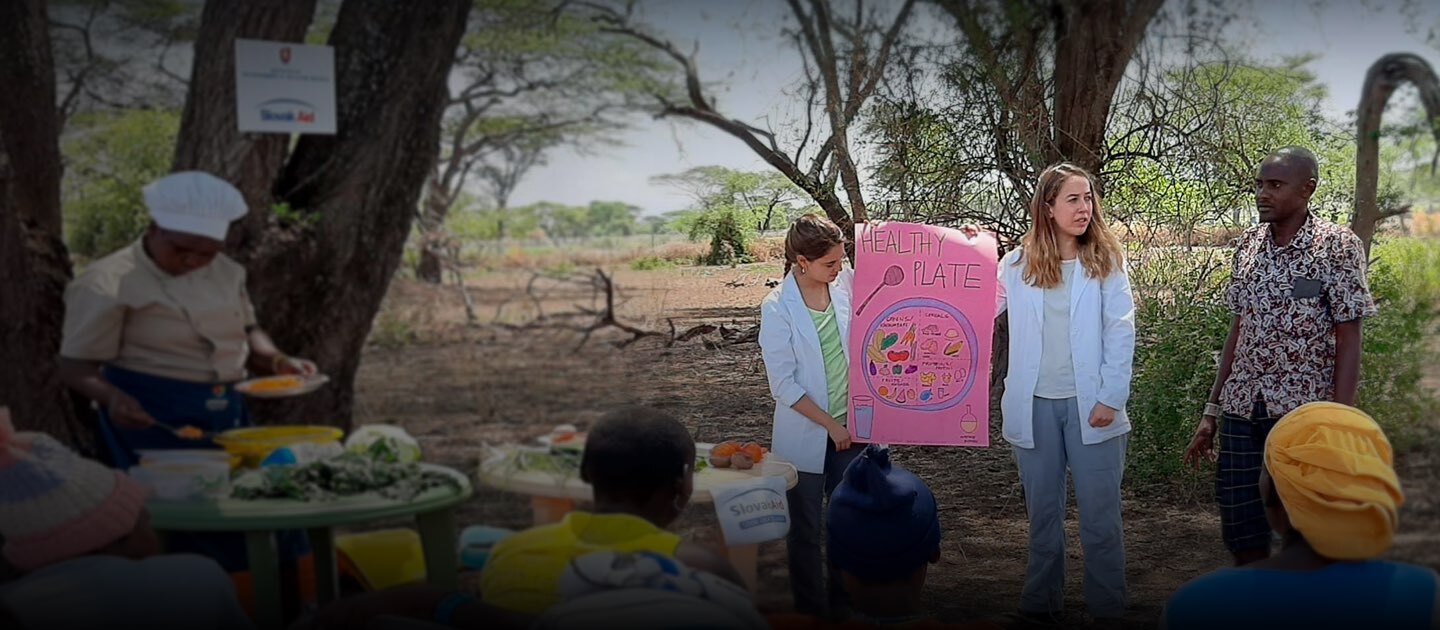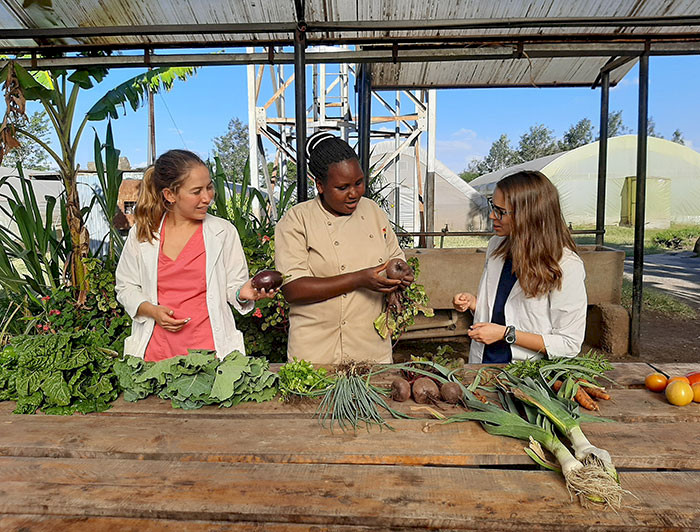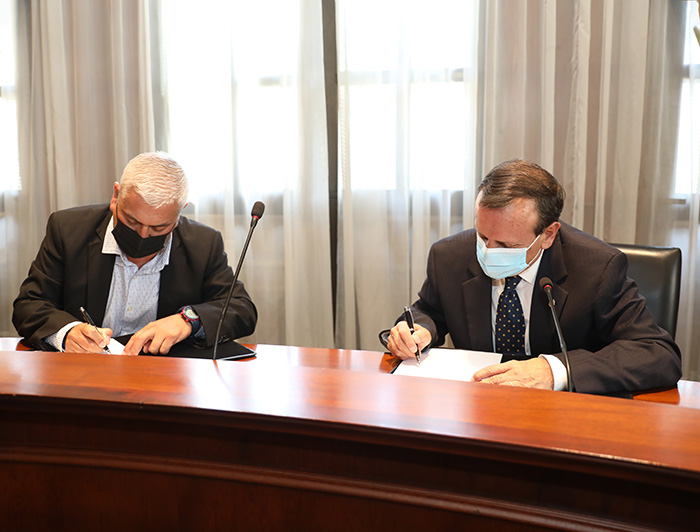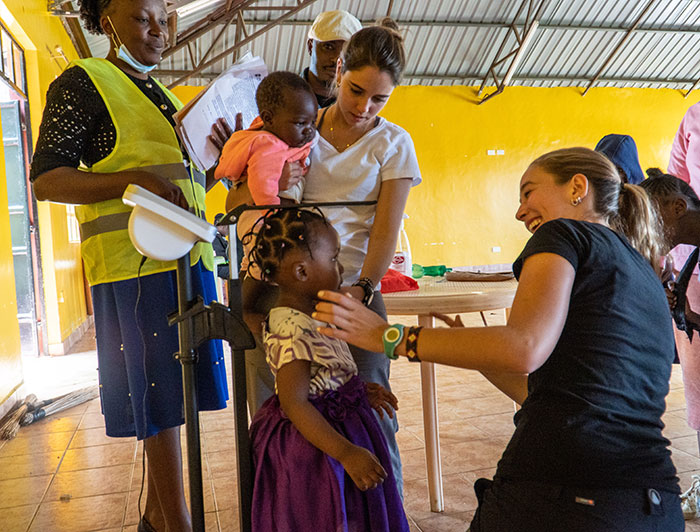
How UC Chile keeps strengtheing its links with Africa
UC Chile signed an agreement with a religious organization that allows its community to volunteer in Kenya. Adding this opportunity to those it already offers in Chad will help the university strengthen its ties with Africa.

photo_camera The agreement between Universidad Católica and the Orione Community Training Center will allow people from the UC community to participate in volunteer programs with children and young people with intellectual disabilities in Kenya. (Image credit: Catalina Reyes and Magdalena Ruiz-Esquide)
Twelve years ago, Father Alejandro Ruiz, a member of the Sons of Divine Providence, made the life-changing decision to leave his job in Chile and travel to Kenya to join his congregation's permanent mission. At the time, he was working in the centers run by "Pequeño Cottolengo," an NGO for abandoned people with intellectual disabilities.
The priest felt that the situation in Chile had improved and that the country was better prepared to care for people with severe and profound intellectual disabilities, so it was time for him to go. He decided to travel to Kenya, where he thought he was needed the most.
He settled in the rural area of Kandisi, 40 kilometers from Nairobi, the capital of Kenya. Then, drawing on his experience working in his congregation's three centers in Chile, he helped build a center.
"Kenya had not yet started working with people with intellectual disabilities. It was a sensitive issue that required resources," said Father Ruiz.
The Center was named Orione Community Training Center (OCTC) Kenya.
Dr Magdalena Ruiz-Esquide and Dr Catalina Reyes, both UC Chile School of Medicine graduates, visited the Center. They volunteered in the rehabilitation area and cared for children with intellectual disabilities.
Before their arrival, the Center had never been willing to receive volunteers. Father Ruiz was particularly reluctant to accept this type of work because of the risk involved: "Poor organization can sometimes cause difficulties for the center and the volunteers."
However, the graduates had a positive experience, and the Center and the university decided to sign a framework agreement.
This agreement will allow members of the UC Chile community to volunteer in the programs offered by the Center in special education, rehabilitation, therapy, and vocational training.
Strengthening Relations with Africa

Towards the end of March, Father Ruiz travelled from Kenya to sign the agreement on April 1st.
President Ignacio Sanchez emphasized that this agreement sought to strengthen "southern cooperation" between Chile and Africa during the signing ceremony, as both countries are geographically located in the "South".
"We shouldn't only be interested in the Northern Hemisphere. We should get to know other realities as well. Supporting and interacting with developing countries, but having in-depth experience, can help us learn greatly."
In 2015, UC Chile recognized Priest Alejandro Ruiz for his efforts in Kenya. For him, the university's role goes beyond Chile's borders.
"We put our experiences in your hands, and, with your expertise, you turn them into something that can be used to show Chile and the world that there is much work beyond the mountain range."
For Lilian Ferrer, the Vice President for International Affairs, signing this agreement is a new opportunity to develop ties with Africa further.
Through educational and medical collaborations with Chad, the university and Africa have had a long-standing relationship.
"Our office is working to internationalize our community, which also implies promoting social commitment and regularly broadening our horizons with those we work with. Africa was on our radar. The university was already doing some collaborative work in Chad and Mozambique, and we've been formalizing those relationships. This agreement in Kenya is a further step in that direction," explained Ms Ferrer.
Experiences in Kenya

Catalina Reyes and her colleague Magdalena Ruiz-Esquide were unsure what they were getting into when they arrived at the Orione Community Training Center.
They just knew they wanted to learn about the culture and contribute to the centre's work.
The first few days, they did different things, from helping to prepare lunch to learn how to use a machete to harvest roots.
As the days went by, they became familiar with the children at the Center.
Natasha, "a very giggly girl with a cheeky face", marked Dr Reyes's stay. The four-year-old girl had spina bifida and could not move her legs.
One day Natasha, who regularly visited the Center, stopped going. Several days went by before they managed to contact her mother with the help of a local team. She told them that an accident had left Natasha with more than half of her chest and her entire arm burned.
"With an untreated wound, poor access to clean water, and no analgesic, it was a miracle that she was still alive," said Dr Reyes.
The doctors did not know what to do. They had never personally seen a case like this before. But, thanks to what they had learned in their classes at UC Chile, they knew these patients had to be referred to high-complexity health centers. But there was nowhere to direct her.
"Then I remembered a burn management class we had in the third year. I decided to contact the professor, even though I hadn't spoken to him in over five years. We waited until it was a reasonable hour in Chile and called him. We told him about the case that we were in Africa and didn't know what to do," said Catalina Reyes.
Dr Álvaro Cuadra and Dr Paula Pino, both surgeons and professors at the Faculty of Medicine, guided them step by step. Both students were impressed by their care and dedication. But most importantly: Natasha's burn healed utterly, without complications or infections.
The experience led both doctors to realize the potential of a collaboration between UC Chile and OCTC Kenya.
"When I think about Kenya, the word that comes to mind is resilience. The Kenyan people have an extraordinary capacity to persevere in the face of adversity, to bounce back and not give up," said Dr Reyes. "Kenyans are long-distance runners who don't give up, and that is a virtue that permeates every aspect of their lives. I hope that this new partnership between UC and the Orione Center will follow that same path of resilience".
For Dr Magdalena Ruiz-Esquide, Kenya defied everything she thought possible. Referring to Natasha's case, she said:
"It challenged what I thought was possible. When Natasha came in with that extensive burn, I knew I had to step up because it was up to me to keep her alive."
Click the video to see the work of the Orione Community Training Center in Kenya:
The implementation plan for the agreement with Kenya
"We are not just signing a piece of paper. Instead, we commit to doing everything humanly possible to make this agreement work," said President Sanchez.
To put the agreement into action, Father Alejandro Ruiz will have the help of former senator and Minister of Justice Hernán Larraín, who for many years worked hand in hand with the priest when he was at Little Cottolengo.
"We hope to do a continued follow-up. We want the initiatives to be coordinated from the university, with the support of third parties, so that there is a real impact in Kenya," said Larraín.
The former senator highlighted the work that UC Chile is doing there.
"Africa is a continent that is not always on Chile's radar. It's not given enough significance in our school curriculums. This is something we need to change".


